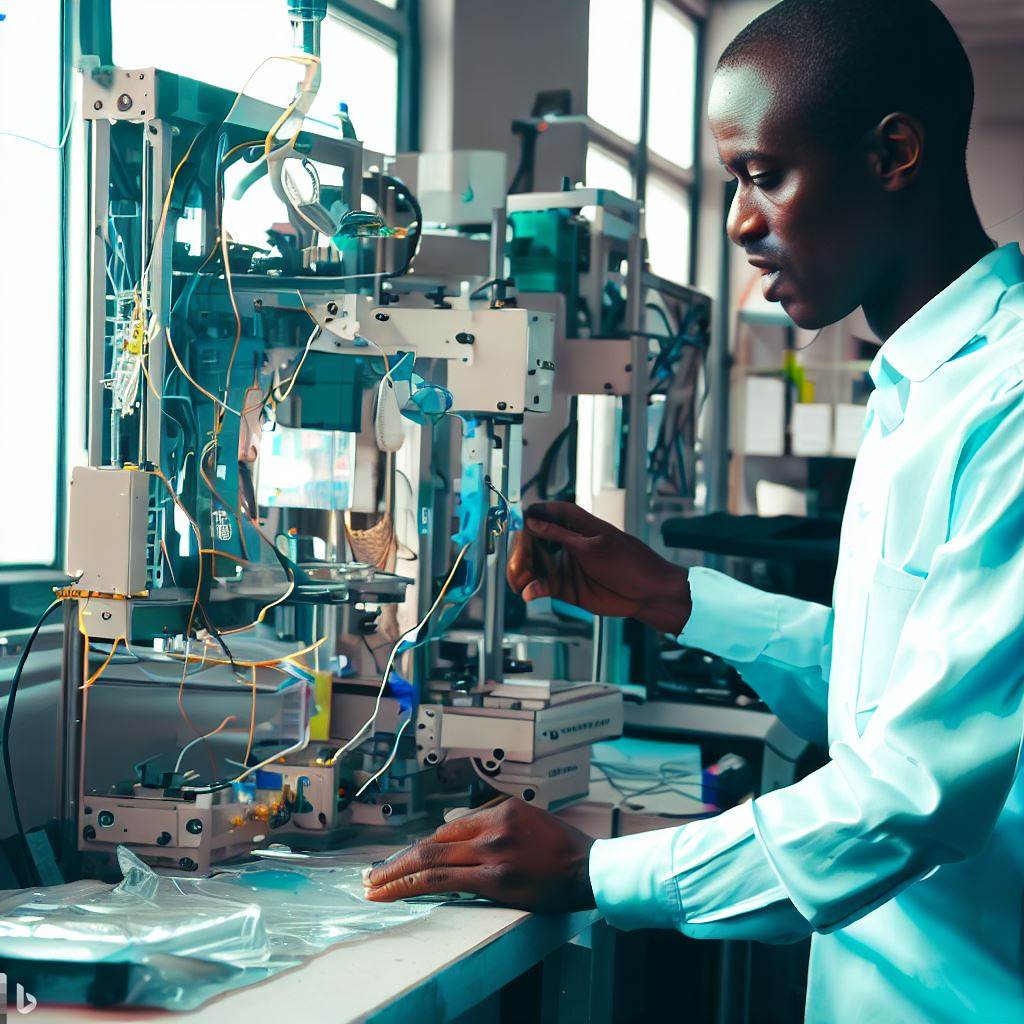Introduction
In the realm of healthcare, the fusion of engineering, medicine, and biology has given birth to biomedical engineering.
This innovative field strives to address healthcare challenges through the synergy of scientific principles and technological ingenuity.
At the heart of this evolution are biomedical engineers who wield their expertise to revolutionize Nigerian hospitals.
They not only elevate patient well-being but also spearhead the creation of cutting-edge medical devices while optimizing the efficiency of hospital procedures.
In Nigeria, biomedical engineers play a pivotal role in reshaping the healthcare landscape.
Through their adeptness at merging diverse disciplines, they craft inventive solutions to intricate medical predicaments.
These professionals stand as vanguards, propelling the nation’s hospitals toward modernization and improved patient care.
Current state of Nigerian hospitals
Limited access to quality healthcare
- Nigeria is facing major challenges in providing its citizens with access to quality healthcare.
- Many Nigerians live in rural areas where healthcare facilities are scarce and inadequate.
- The lack of proper infrastructure and resources limits the availability of quality healthcare services.
- As a result, people often have to travel long distances to receive medical treatment, leading to delays and complications.
- The cost of healthcare in Nigeria is also a major barrier for many citizens, especially those living in poverty.
Insufficient medical equipment and technology
- Nigerian hospitals suffer from a lack of adequate medical equipment and technology.
- Advanced medical tools and devices are essential for accurate diagnosis and effective treatment.
- The shortage of equipment hinders the ability of healthcare professionals to provide quality care.
- Outdated technology also poses a risk to patients, as it can lead to misdiagnosis or ineffective treatments.
- Biomedical engineers play a vital role in addressing this issue by introducing and maintaining modern medical equipment.
Lack of specialized healthcare professionals
- Nigerian hospitals lack an adequate number of specialized healthcare professionals.
- The shortage of specialists, such as cardiologists or neurologists, contributes to limited healthcare options.
- Many Nigerian doctors and specialists choose to work abroad due to better opportunities and incentives.
- The absence of specialized professionals in the country puts additional strain on the healthcare system.
- Biomedical engineers can help bridge this gap by training local healthcare professionals in specialized areas.
In fact, Nigerian hospitals currently face numerous challenges including limited access to quality healthcare, insufficient medical equipment and technology, and a lack of specialized healthcare professionals.
These issues contribute to the overall state of healthcare in Nigeria.
However, the role of biomedical engineers is crucial in transforming Nigerian hospitals by introducing modern medical equipment, improving infrastructure, and training local healthcare professionals.
By addressing these challenges, Nigeria can improve the quality and accessibility of healthcare for its citizens.
Role of Biomedical Engineers in Nigerian Hospitals
Implementing advanced medical equipment
- Importance of innovative technology in healthcare.
- Examples of medical equipment being utilized.
Importance of innovative technology in healthcare
Biomedical engineers play a crucial role in Nigerian hospitals by implementing advanced medical equipment.
This is important because innovative technology has the potential to revolutionize healthcare in the country.
With the help of biomedical engineers, hospitals in Nigeria are able to utilize cutting-edge equipment and ensure that patients receive the best possible care.
Examples of medical equipment being utilized
There are several examples of medical equipment that biomedical engineers are currently implementing in Nigerian hospitals.
For instance, MRI machines, CT scanners, and ultrasound devices are used for diagnosing and monitoring various medical conditions.
These high-tech tools enable healthcare professionals to accurately assess patients’ health and make informed treatment decisions.
Developing and maintaining medical devices
- Designing customized medical devices.
- Regular maintenance and troubleshooting.
In addition to implementing advanced medical equipment, biomedical engineers also have a significant role in developing and maintaining medical devices in Nigerian hospitals.
They are involved in designing customized devices that cater to the specific needs of patients and healthcare professionals.
Biomedical engineers also ensure the smooth functioning of medical devices through regular maintenance and troubleshooting.
They are responsible for conducting routine checks, repairs, and calibration of equipment to guarantee that they are in optimal working condition.
This helps in preventing any disruptions in healthcare services and ensures that patients receive accurate and reliable results from the devices.
Collaborating with healthcare professionals
- Work alongside doctors and nurses.
- Ensuring smooth integration of technology and treatment.
Biomedical engineers collaborate closely with healthcare professionals in Nigerian hospitals, including doctors and nurses.
They work together to bridge the gap between technology and treatment, ensuring that medical devices are seamlessly integrated into the healthcare environment.
By working alongside doctors and nurses, biomedical engineers can understand the specific requirements and challenges faced by healthcare professionals.
This collaboration allows for the development and implementation of technology that enhances patient care and improves overall healthcare outcomes.
Research and development in healthcare solutions
- Studying and improving existing medical procedures.
- Developing cost-effective solutions for Nigerian hospitals.
Another critical role of biomedical engineers in Nigerian hospitals is conducting research and development in healthcare solutions.
They play a key role in studying and improving existing medical procedures to enhance their efficacy and patient outcomes.
Furthermore, biomedical engineers are involved in developing cost-effective solutions specifically tailored to the needs of Nigerian hospitals.
They strive to find innovative ways to deliver quality healthcare while keeping expenses manageable, making healthcare more accessible to the population.
In the end, biomedical engineers have a vital role to play in transforming Nigerian hospitals.
They are responsible for implementing advanced medical equipment, developing and maintaining medical devices, collaborating with healthcare professionals, and conducting research and development in healthcare solutions.
By fulfilling these responsibilities, biomedical engineers are contributing to the advancement of healthcare in Nigeria and improving the lives of its citizens.
Read: Professional Bodies for Biomedical Engineers in Nigeria

Impact of biomedical engineers in Nigerian hospitals
Improved patient care and diagnosis
Biomedical engineers in Nigerian hospitals are making a significant impact on patient care and diagnosis.
Through their expertise and technological advancements, these engineers have enhanced the accuracy of medical tests and diagnoses.
They are constantly working to improve existing medical equipment and develop new tools for precise diagnosis.
By implementing advanced imaging techniques and utilizing cutting-edge technology, biomedical engineers have revolutionized the field of medical diagnosis in Nigerian hospitals.
These advancements have enabled healthcare professionals to detect diseases and conditions more accurately.
Consequently, patients receive timely and appropriate treatment options, leading to improved health outcomes.
Increased access to healthcare services
Another notable contribution of biomedical engineers in Nigerian hospitals is their role in increasing access to healthcare services.
By utilizing innovative strategies and technologies, these engineers have extended the reach of quality healthcare to remote and underserved areas in the country.
Through telemedicine and mobile health solutions, biomedical engineers have brought medical expertise to communities that previously had limited access to healthcare.
Patients in remote areas can now receive medical consultations and even undergo certain diagnostic tests without traveling long distances.
This has significantly improved healthcare outcomes for individuals in these areas and reduced the burden on urban healthcare facilities.
Additionally, the improved facilities and services provided by biomedical engineers have led to a reduction in medical tourism. In the past, Nigerians seeking specialized treatment had to travel abroad, often at considerable expense.
However, with the advancements brought about by biomedical engineers, more Nigerians can now receive high-quality healthcare within the country itself.
Empowering local talent and economy
The impact of biomedical engineers goes beyond patient care and access to healthcare services.
These professionals are playing a crucial role in empowering local talent and boosting the Nigerian economy.
By creating job opportunities for fellow biomedical engineers, they are contributing to the growth of the healthcare sector and the overall economy.
The presence of biomedical engineers in Nigerian hospitals has stimulated local innovation and manufacturing.
With their expertise, these engineers have provided valuable insights and support to local companies in designing and producing medical equipment.
This not only reduces reliance on imported products but also contributes to the growth of domestic manufacturing capabilities.
Moreover, by fostering collaboration between biomedical engineers and other healthcare professionals, there is a greater flow of ideas and knowledge within the Nigerian healthcare system.
This collaborative approach supports local talent development and encourages innovation in healthcare practices.
In essence, biomedical engineers are transforming Nigerian hospitals in multiple ways.
Their contributions have led to improved patient care and diagnosis, increased access to healthcare services, and the empowerment of local talent and the economy.
Through their expertise and commitment to innovation, these engineers are making a lasting impact on healthcare in Nigeria.
Read: Ethics in Biomedical Engineering: A Nigerian Perspective
Challenges faced by biomedical engineers in Nigerian hospitals
Biomedical engineering holds great potential in transforming Nigerian hospitals, but it comes with its fair share of challenges.
In this section, we will explore the difficulties faced by biomedical engineers in Nigerian hospitals and how they are working to overcome them.
Limited funding and resources
- Biomedical engineers in Nigerian hospitals often struggle with limited funding, which hampers their ability to acquire essential equipment and technology.
- The lack of financial resources also makes it difficult for them to attend conferences and training programs to enhance their knowledge and skills.
- Limited resources mean that biomedical engineers have to find innovative solutions and work within tight budgets to provide optimal healthcare services.
Lack of awareness and understanding
- Many hospitals in Nigeria still lack awareness about the role and importance of biomedical engineers, leading to a lack of recognition and support for their work.
- This lack of understanding often results in low priority given to biomedical engineering departments and their needs.
- Biomedical engineers face the challenge of raising awareness among healthcare professionals and administrators about their contribution to improving patient care.
Infrastructural constraints and electricity issues
- Nigerian hospitals often face infrastructural constraints, such as outdated buildings and inadequate space for equipment and technology.
- Inconsistent electricity supply and frequent power outages pose significant challenges for biomedical engineers who rely on electricity to operate and maintain medical equipment.
- Biomedical engineers have to find alternative power sources or employ backup systems to ensure uninterrupted healthcare services.
Despite these challenges, biomedical engineers in Nigerian hospitals are finding innovative ways to overcome them and make a positive impact on healthcare:
- Collaboration with international organizations and universities helps Nigerian biomedical engineers access funding and resources for their projects.
- Advocacy efforts by professional associations and biomedical engineering societies raise awareness and promote the importance of their work.
- Biomedical engineers are working closely with hospital management to emphasize the need for infrastructure upgrades and consistent electricity supply.
- Training programs and workshops are being conducted to enhance the skills and knowledge of biomedical engineers in Nigeria.
- Community engagement and public campaigns help in educating the masses about the role and impact of biomedical engineering in healthcare.
In general, biomedical engineers in Nigerian hospitals face challenges such as limited funding, lack of awareness, and infrastructural constraints.
However, through collaborative efforts, advocacy, and skill enhancement, they are finding solutions to these obstacles.
With ongoing support and recognition, biomedical engineers have the potential to transform healthcare in Nigeria and improve patient outcomes.
Read: Biomedical Engineering: Building a Sustainable Future in Nigeria
Potential solutions and future prospects
The transformation of Nigerian hospitals through the work of biomedical engineers is an ongoing process.
While significant progress has been made, there are still challenges to overcome and further improvements to be made.
In this final section, we will explore potential solutions and future prospects for the field.
Advocacy for increased funding and resources
One of the main barriers to the effective transformation of Nigerian hospitals is the lack of funding and resources.
Biomedical engineers require adequate tools, equipment, and materials to carry out their work efficiently.
Advocacy efforts should focus on lobbying the government and other stakeholders to allocate more funds to the healthcare sector specifically for biomedical engineering initiatives.
With increased funding, hospitals can acquire cutting-edge technology and equipment, enhancing their ability to provide exceptional patient care.
Read: Universities Offering Robotics Engineering in Nigeria
Education and awareness campaigns
Another crucial aspect of transforming Nigerian hospitals is the need for education and awareness campaigns.
Biomedical engineering is still a relatively new field in Nigeria, and many people are unaware of its potential impact on healthcare.
By conducting campaigns and workshops in schools, communities, and universities, the public can be educated about the role of biomedical engineers and the importance of their work.
Increased awareness will lead to a greater appreciation for the field, attracting more students to pursue careers in biomedical engineering and cultivating a skilled workforce for the future.
Collaboration with international partners for support
No transformation can be achieved in isolation, and the same applies to Nigerian hospitals.
Collaboration with international partners is crucial for receiving support in terms of expertise, funding, and technology transfer.
International organizations, academic institutions, and biomedical engineering associations can provide valuable assistance through knowledge exchange programs, research collaborations, and financial aid.
By partnering with experienced professionals from around the world, Nigerian biomedical engineers can learn from best practices and implement innovative solutions to address healthcare challenges.
In short, the transformation of Nigerian hospitals through biomedical engineering requires a multi-faceted approach.
Advocacy for increased funding and resources, combined with education and awareness campaigns, will help create an enabling environment for biomedical engineers to thrive.
Collaboration with international partners is equally important, as it brings expertise and support to enhance the quality of healthcare in Nigeria.
By implementing these strategies, Nigerian hospitals can continue to evolve and provide the best possible healthcare services to their communities.
Read: Pioneers of Biomedical Engineering in Nigeria: A Spotlight
Find Out More: Understanding the Flight Engineer Role in Nigeria’s Aviation
Conclusion
A recap of the role and impact of biomedical engineers in Nigerian hospitals
- Biomedical engineers play a crucial role in transforming Nigerian hospitals by designing and maintaining medical equipment.
- They contribute to improved patient care, increased efficiency, and enhanced diagnosis and treatment.
- Their expertise ensures that healthcare providers have access to reliable and functional equipment.
- Biomedical engineers also train local staff on proper use and maintenance of the medical devices.
- They work closely with healthcare professionals to understand their needs and develop innovative solutions.
An optimistic outlook for the future of healthcare in Nigeria:
- The presence of biomedical engineers in Nigerian hospitals is expected to grow.
- More professionals are likely to be trained, ensuring a larger impact on healthcare delivery.
- The advancements in medical technology driven by these engineers will continue to save lives and improve health outcomes.
- The Nigerian healthcare system will become more self-sufficient in managing its medical equipment and technology.
- Collaboration between biomedical engineers, healthcare professionals, and policymakers will further drive progress in the sector.
In summary, the role of biomedical engineers in Nigerian hospitals is invaluable.
Their contributions have resulted in significant advancements in healthcare delivery and will continue to do so in the future.
By leveraging their expertise, Nigeria can overcome challenges and build a robust healthcare system that meets the needs of its population.




